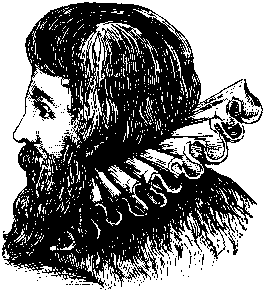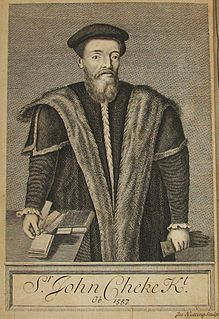
Roger Ascham was an English scholar and didactic writer, famous for his prose style, his promotion of the vernacular, and his theories of education. He served in the administrations of Edward VI, Mary I, and Elizabeth I, having earlier acted as Elizabeth's tutor in Greek and Latin between 1548 and 1550.

Sir John Cheke (Cheek) was an English classical scholar and statesman. One of the foremost teachers of his age, and the first Regius Professor of Greek at the University of Cambridge, he played a great part in the revival of Greek learning in England. He was tutor to Prince Edward, the future King Edward VI, and also sometimes to Princess Elizabeth. Of strongly Reformist sympathy in religious affairs, his public career as provost of King's College, Cambridge, Member of Parliament and briefly as Secretary of State during King Edward's reign was brought to a close by the accession of Queen Mary in 1553. He went into voluntary exile abroad, at first under royal licence. He was captured and imprisoned in 1556, and under threat or apprehension of execution by the fire made a forced public recantation and affiliated himself to the Church of Rome. He died not long afterwards, filled with remorse for having forsworn his true belief from the infirmity of fear. His character, teaching and reputation were, however, admiringly and honourably upheld.
Baron Cromwell is a title that has been created several times in the Peerage of England. The first creation, which was by writ, was for John de Cromwell in 1308. On his death, the barony became extinct. The second creation came in 1375 when Ralph de Cromwell was summoned by writ to Parliament as Lord Cromwell. His grandson, the third baron, served as Lord High Treasurer to King Henry VI. However, on his death in 1455 the barony fell into abeyance between his nieces Maude and Joan. On Joan's death in 1490 the abeyance was terminated in favour of Maude, the fourth holder. When she died childless in 1497 the peerage once again fell into abeyance, this time between the daughters of the first baron. The title remained in abeyance for over 400 years. However, in 1922 the Committee for Privileges of the House of Lords reported in favour of the petition for the termination of the abeyancy of Selina Frances Bewicke-Copley. She was the daughter of Sir Charles Watson Copley, 3rd Baronet, and one of the co-heirs of Maud, daughter of the first baron Cromwell. Selina died in 1923 and in July of the same year the abeyance was terminated in favour of her son Robert Godfrey Wolesley Bewicke-Copley, who became the fifth baron. He notably served as Lord Lieutenant of Leicestershire. As of 2010 the ancient barony is held by his grandson, the seventh baron, who succeeded his father in 1982. Having lost his seat in the House of Lords under the House of Lords Act 1999, in April 2014 he was elected at a hereditary peers' by-election as a Crossbencher.

Sir Richard WingfieldKG of Kimbolton Castle was an influential courtier and diplomat in the early years of the Tudor dynasty of England.
Sir Francis Englefield was an English courtier and Roman Catholic exile.

Brantham is a village and civil parish in the Babergh district of Suffolk, England. It is located close to the River Stour and the border with Essex, around 2 miles (3 km) north of Manningtree, and around 9 miles (14 km) southwest of Ipswich.
John de Vere, 16th Earl of Oxford was born to John de Vere, 15th Earl of Oxford and Elizabeth Trussell, daughter of Edward Trussell. He was styled Lord Bolebec 1526 to 1540 before he succeeded to his father's title.
This is a list of Sheriffs of Norfolk and Suffolk. The Sheriff is the oldest secular office under the Crown and is appointed annually by the Crown. He was originally the principal law enforcement officer in the county and presided at the Assizes and other important county meetings. After 1576 there was a separate Sheriff of Norfolk and Sheriff of Suffolk.
Sir Humphrey Wingfield was an English lawyer and Speaker of the House of Commons of England between 1533 and 1536.
John Garvey (1527–1595) was an Irish Protestant Bishop of Kilmore and Archbishop of Armagh.

Sir Anthony Wingfield KG, MP, of Letheringham, Suffolk, was an English soldier, politician, courtier and member of parliament. He was the Lord Lieutenant of Suffolk from 1551 to 1552, and Vice-Chamberlain of the Household in the reign of Edward VI.
Richard Argentine, alias Sexten, M.D,, was an English physician and divine.
Samuel Jebb was an English physician and literary scholar.
Sir Edmund Rous, of Dunwich, Suffolk, was an English landowner, magistrate, MP and Vice-Treasurer of Ireland.
Sir John Sulyard, of Wetherden and Haughley, Suffolk, was a prominent East Anglian magistrate, landowner, High Sheriff, knight and standard-bearer, strongly Roman Catholic in religious affiliation, who sat in parliament during the reign of Queen Mary.
John Proctor (1521–1558) was an English academic and schoolmaster, known as a historian.
John Seton D.D. was an English Roman Catholic priest, known as the author of a standard logic text.
Robert Ware was a historian and forger of historical documents, which he applied to Protestant polemics.

Sir Edward Echyngham, , of Barsham and Ipswich in Suffolk, was a commander on land and at sea, briefly Constable of Limerick Castle, and Collector of Customs at Ipswich. He is remembered as the author of a letter to Cardinal Wolsey describing the death of Lord Admiral Howard at Brest in 1513. From 1485 the presence of the Howard Dukes of Norfolk was felt directly along the Barsham reach of the River Waveney from their possession of Bungay Castle.

St Helen's Church, Ipswich is an Anglican church in Ipswich, Suffolk, England. The church is built from knapped flint rubble with additional stone and white brick dressings. Although some of the building dates back to the medieval period, the building was substantially altered in the nineteenth century.